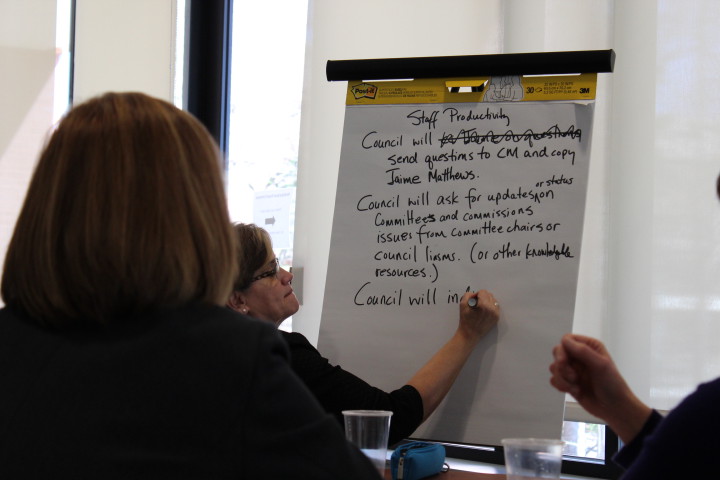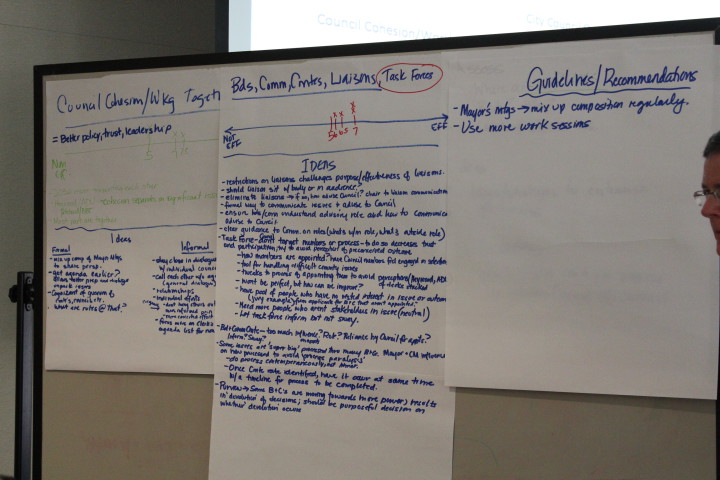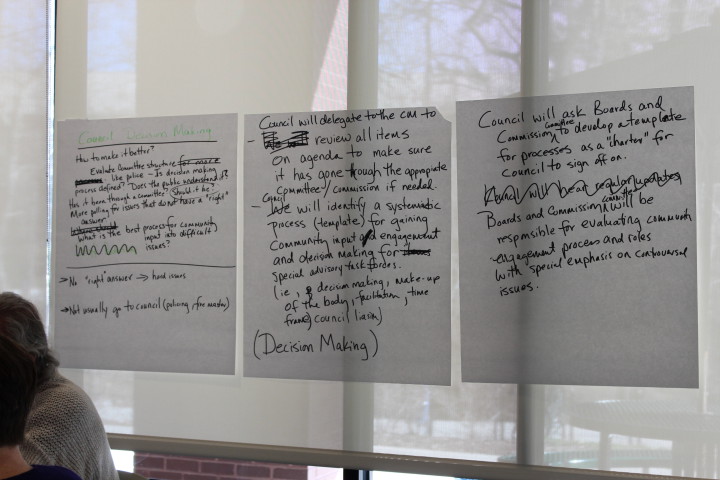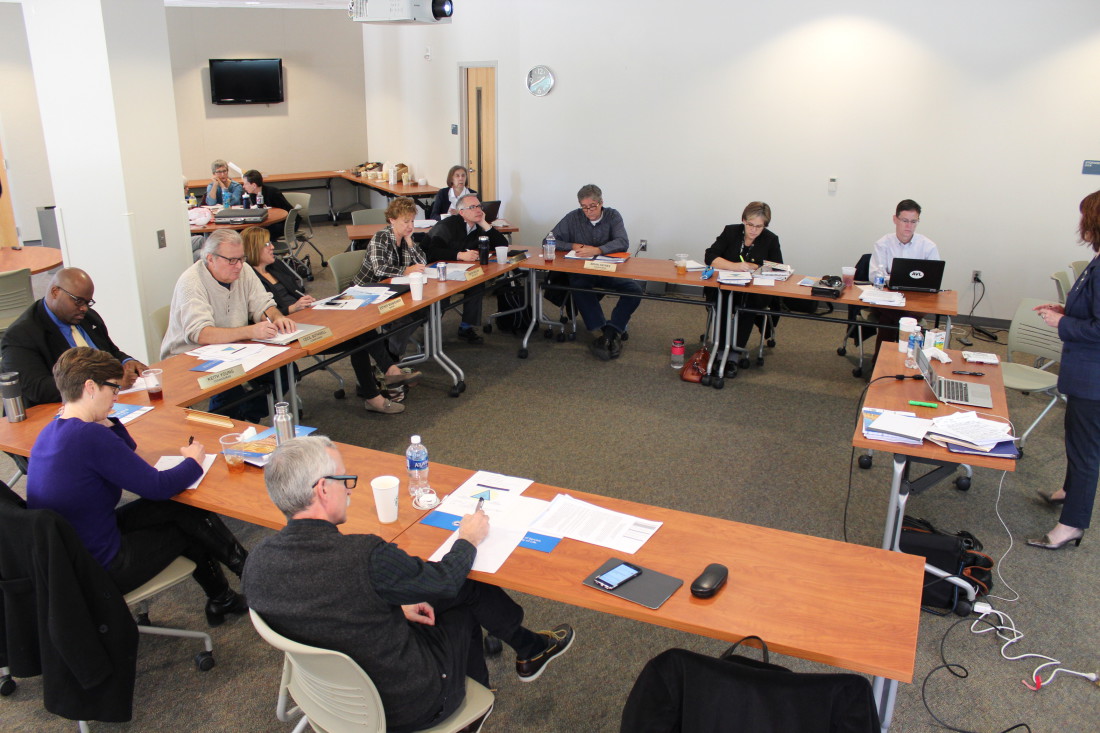Asheville City Council convened in a regular session on Valentine’s Day, and the elected leaders still seemed to be feeling the love at their annual planning retreat on Friday, Feb. 17. As directed by facilitator Tyler St. Clair (who also led last year’s meeting), Council listed a number of 2016 accomplishments. Council also expressed gratitude to the city’s staff for doing the legwork that made those successes possible.
In the second half of the session, Council took a close look at its operating practices and agreed on some procedural tweaks. Those changes relate to the functioning of city boards and commissions, communication with city staff and among Council members and vetting agenda items before issues come before the full Council.
One new protocol suggested by City Manager Gary Jackson and readily approved by Council seems likely to tighten Jackson’s control over the flow of information between elected officials and city staff. Rather than directing questions to department heads or other staff members, Jackson proposed, Council members should route all communication through him and his assistant, Jaime Matthews. Jackson and Matthews will then direct the question or request to the most appropriate staffer.
The exceptions to this policy would be Council communication with City Attorney Robin Currin and City Clerk Maggie Burleson.

Coming together
For most attendees, the meeting spot in the multipurpose room of the Overlook Hall dormitory on the UNC Asheville campus was unfamiliar. Several observers of local politics commented on Facebook that the venue seemed to have been selected without much concern for the convenience of members of the public who might wish to attend. Throughout the day-long session, between 10 and 15 members of the public observed the proceedings. The meeting agenda didn’t include an opportunity for public comment.
Council started the day with a team building exercise designed to “set the climate” for the day’s work, according to St. Clair. Pleading nervousness, Council member Brian Haynes went first, saying he grew up near Merrimon Avenue as the son of a single father who “sacrificed everything to raise three boys.” Along with the example of his dad, Haynes said, he was shaped by the experiences and issues of the 1960s and 1970s, including Watergate, the civil rights movement and the Vietnam War. His hobbies include visiting local breweries, painting (though he doesn’t have much time for it now) and spending time with family. Haynes said he hasn’t yet found his leadership niche on Council.
Council member Gordon Smith, who has said he won’t run for re-election this year, pointed to his grandfather’s resilience in the face of catastrophe as a formative event in his early life. An orange grower near Lakeland, Florida, Smith’s grandfather lost all his trees in a massive freeze when Smith was in his teens. After a couple of months of forced retirement, Smith’s grandfather decided to replant the orchard. “That understanding that he was going to use his land and his labor and his community to rebuild and follow his path in life — that was formative for me,” Smith said. Smith’s hobbies include outdoor sports that “get me involved with other people.” He said the experience of chairing the city’s Housing and Community Development Committee has been a highlight of his work on Council.
Vice Mayor Gwen Wisler described a memory from her childhood in Ohio as the third of four children of an insurance salesman and a homemaker. She had managed to sew a sleeve into a garment upside down, and her “bad temper” expressed itself in the form of a tantrum that included throwing the garment and kicking a wall. After she had calmed down, Wisler remembered her mother saying, “You’ve got to get control of that temper.” Perhaps surprisingly given her earlier frustration with textiles, Wisler said her hobbies now include needlework and lacemaking. Moving on to how she sees her leadership role on Council, Wisler became emotional and paused before continuing, “I just think it’s the practicality I bring, trying to do the work and move toward our goals without becoming all passionate about it.”
Mayor Esther Manheimer joked about what she said her family calls, “FCMs,” which stands for “false childhood memories.” Though her brother and sister have different recollections, she said, her impressions of a childhood spent in Denmark and California are happy ones: “All I remember is a lot of fun.” Manheimer cited a college professor’s requirement that she and her classmates attend city council and other local government meetings as a formative experience. “That gelled my interest in local government,” she said. In her limited free time, Manheimer said she likes to work out, cook, bake and read. “I’m always reading several books at one time,” she said. She described her leadership role as creating a comfortable atmosphere where people feel they can participate in local government.
Council member Cecil Bothwell told a story about appearing before a review board in pursuit of his Eagle Scout credential. One of the members of the panel asked Bothwell to promise that he would obtain his “God and Country,” badge, which was optional. “I said yes knowing that I wouldn’t do it. I was over religion at that moment,” said Bothwell, explaining that he felt the reviewer was trying to compel religious belief. “That was critical in the choices I made later,” he said. Bothwell is an author who is currently working on his eleventh book. He paints, plays guitar, gardens and cares for three cats and a chihuahua named Bernie. (“Yes, that Bernie,” Bothwell said.) His leadership role springs from his conviction that climate change represents an existential threat to modern civilization and the human race. Bothwell said he’s been trying to reduce his personal carbon footprint over the past 25 years. “Any issue, if it has that element of reducing carbon emissions or sequestering carbon, it’s really important for me to bring that to City Council,” he said.
Council member Keith Young, who grew up in Asheville’s East End, remembered how hard his parents worked all their lives. His father, he said, put on a suit every morning to go to work in a state job. In the evening, he’d come home and change into jeans to go back out to clean buildings. His mother worked in a factory and put in overtime nearly every week, he said. Young pointed to several members of his extended family (including both his parents) having attended college as the inspiration and role model for his own path in life. Young said he enjoys listening to and producing music, especially hip-hop and R&B. While he’s still finding his leadership role on Council, he said, “I think I’m a good listener.”
Though she grew up in the Atlanta area, Council member Julie Mayfield said her connections to Western North Carolina go way back. Members of her mother’s family have farmed in Jackson County for the past 100 years, she said, and she spent time at the family farm throughout her childhood. Recalling her father, a psychologist, Mayfield became tearful. She told a story about how her parents hosted a house party for Andrew Young, Atlanta’s second African-American mayor, in their “lily-white suburb” to the city’s northwest. Although she didn’t really understand the significance of Young’s campaign, she said, she did know it was “a big deal,” and she felt proud of her parents for supporting Young. Mayfield said she enjoys cycling and hiking, and she’s pleased to be getting back into playing tennis after a number of years away from the sport. She said she is glad to be representing City Council in some “deep and complex conversations around Interstate 26 and energy. … That’s the kind of work I love: getting into a complex issue with a group of people and figuring out a way forward.”
City Manager Gary Jackson also participated in the exercise. The notoriously private bureaucrat opened up, saying his early childhood resembled the culture and experiences depicted in the recent book Hillbilly Elegy by J.D. Vance. “The events in my early life included my dad getting drunk and beating the crap out of all of us,” Jackson said. That experience, as well as his mother’s courage in escaping the situation, shaped the rest of his life, he said. Working as a bookkeeper in Dayton, Ohio, Jackson recalled, his mother had a hard job in providing for and raising two children. One morning, he said, his mother dropped him off on the block where his new kindergarten was located, leaving it to him to find the school. Jackson said the message was one of personal responsibility: “You figure it out, and if you mess it up, I’m going to spank your butt.” He said he loves cycling as a member of a team. When it comes to leadership, Jackson said, “I’ve always been the person that people turn to to get stuff done. I seem to be able to find a model to make stuff happen. That’s what I like to do.”
Young commented, “Everyone on Council has a lot of emotion and passion on an ideological level and a political level. Hearing these stories helps you understand where that comes from. We all have a lot in common that we don’t know about. I can empathize with everybody here. It’s good to see people as human.”
If we do say so ourselves
St. Clair encouraged Council to reflect on their successes, a charge the group took up with enthusiasm. Council members listed accomplishments including:
- Supported a revised Use of Force policy for the Asheville Police Department
- Passed a $74 million bond referendum
- Made progress toward updating the city’s Comprehensive Plan, including individual plans for 29 city neighborhoods
- Enacted new zoning ordinances for downtown and hotel development, as well as expanded requirements for neighborhood notification and input into development projects
- Created the Energy Innovation Task Force to collaborate with Buncombe County, Duke Energy and other stakeholders on the region’s energy future
- Retained control of the city’s water system
- Improved communication with citizens, including a new city website as well as other open government initiatives
- Funded a disparity study and moved toward hiring an Equity and Diversity Manager
- Implemented new busking regulations
- Participated in planning for the Interstate 26 connector and widening projects
Several Council members suggested that members of the media might wish to report on the list in its entirety, but contented themselves with directing city communication staff to share the positive news.
“It feels good to know that all this has happened and now we are getting the recognition for it. Staff has definitely been working hard,” said Assistant City Manger Cathy Ball.
“The staff loves meaningful work, and producing results is reinforcement on its own,” said Jackson. “I’m hearing concerns about attention to strategic goals versus operations,” he said. “You know, keeping the trains running on time, picking up garbage, police and fire services,” he continued. Another issue is having time to train and coordinate staff.
Assistant City Manager Paul Fetherston observed that Asheville is a very engaged community. It’s important to figure out, he said, “how to manage and focus that in a productive direction.” The public’s energy, he said, can sometimes be directed into the city organization and then it “has no way to get out.” Citizen advisory boards and commissions, he said, can help or hurt the city’s performance, and they must be managed.
As a new member of City Council, Mayfield reflected, “Previous years have not seen this level of success. We [members of Council] are not aligned on everything, but we are all unified in this vision.”
Mixing it up
After a break for lunch, St. Clair asked Council members to break into two groups to discuss what she called Council’s operating guidelines: how members of Council work together and with city staff to accomplish the city’s business.
From those discussions, Council agreed on a number of process changes. To create greater cohesiveness among members of the group, Council members agreed to call one another first before seeking information from city staff. When sending information by email for review, Council members agreed to summarize the information and indicate what action is needed at the top of the email.


A change to the mayor’s monthly meetings with Council members is intended to help different members get to know one another better. Currently, the mayor meets with three groups of two Council members each (to avoid violating rules against unofficial meetings where a quorum of Council members are present). The pairing of Council members is the same each month. Going forward, the pairings will change each month, to increase contact among different members of Council.
When new issues emerge that need action or discussion, Council will forward them to the appropriate city board or commission. In cases where it isn’t clear what board or commission would be best, the issue will be considered by the Council’s Governance Committee.
Council agreed to clarify the role of Council liaisons — the member of Council designated to serve as a go-between with each city board and commission. Some of the questions to be resolved include: Should liaisons attend the meetings of the boards and commissions they are responsible for? When they do attend, should they refrain from speaking or directing events? How should the liaison ensure that the board or commission is acting in accordance with its Council-directed mission?
To avoid bringing an issue before Council before it’s been properly vetted by a city board or commission or Council committee — as recently happened in the case of proposed renovations at Pritchard Park — the mayor and City Manager will examine each Council meeting agenda item to determine whether it has been through the appropriate city process.
A partial list of upcoming agenda items will be added to the end of each current City Council meeting agenda.
To speed up the progress of an issue through the city process, efforts will be made to have issues reviewed concurrently by multiple boards and commissions, if needed. Previously, issues were reviewed consecutively by different bodies.
The city’s Boards and Commissions Committee will draft two new tools. For ad hoc committees formed to advise Council on controversial issues, the Boards and Commissions Committee will develop a template that will detail the task assigned to the committee, its expected deliverable, the schedule and options for committee governance.
One such ad hoc committee, the Homestay in Accessory Dwelling Unit (ADU) task force, ran into problems related to schedule and process as it struggled to present its conclusions to Council earlier this year. Another body, the Haywood Street Visioning Team, is still completing its assigned task of creating a community vision for city-owned property facing the Basilica of St. Lawrence and U.S. Cellular Center, but some members of that team have expressed concerns about the group’s process to members of Council and to the media.
Council agreed to maintain a list of citizens who are open to serving where there’s a need to help balance perspectives on boards or ad hoc committees that handle controversial topics.
Boards and Commissions will also develop a template to guide boards and commissions in preparing their annual reports.
Council members acquiesced to Jackson’s suggestion that communication with city staff be routed through him and Matthews to increase efficiency and minimize demands on staff time and attention.
A summary of Council’s amended operating guidelines will be prepared by St. Clair and reviewed by Jackson and Manheimer. The final document will be included in Council’s consent agenda for its Feb. 28 meeting.




Proud of what? Taking all the money and giving it to their friends? Making the rich even richer? Being known for an area that RELIES on low wages to keep it rolling? Using taxes to promote the interest of the wealthy, the developers, the cronies, the corrupt? Expecting residents to foot the bill of the tourist trap industry?
What have they done for you?
They fought successfully to keep the State from seizing our water system. Thanks, City Council!
Excuse me but how is it our water system when you live in Woodfin? Do you also pay the bogus stormwater fees? I didn’t think so.
I am a customer of the Asheville water system.
“What have they done for you?”
They haven’t restored segregated drinking fountains at City Hall. I’m sure you’re sad about that.
LOL, oh the token accusation of racism by the elitist who dare not leave whitebread land for fear of the unknown lulz. Instead will just vote in bigger taxes to rid many blacks from the area. Why Luther haven’t you read the news? Blacks are leaving because of your INTENDED consequences of higher costs. It’s like Jim Crow but under the guise of economics.
I’m not the one complaining that “the American experiment has been on hold since about 1965.”
Why so specific about that year?
Excellent and complete reporting! The only exception I take is the characterization of our communication with Staff via the City Manager. The existing rules have always been that Council should only deal with the three people we hire: Manager, City Attorney, City Clerk. The intent there is to prevent Council members from exerting pressure on Staff members, to attempt to influence action or policy that hasn’t been formalized by Council action, etc.
In practice however, some of us — and I’m guilty here — have copied e-mail queries to both Jackson and the department head or perhaps a particular Staffer working on a particular issue. By copying it to Jackson my sense was that there was no violation of the intent of the rule, since the City Manager was fully informed.
The problem I and others didn’t understand was that we could easily be wasting Staff time because our queries might not have gone to the right person or even department. Say for example I shot what I deemed to be a Transportation question to Transportation head Ken Putnam and Gary Jackson, but it was actually a Public Works matter. You can see that I’ve now looped in the wrong person and department, so Ken might forward to Public Works, and Gary or Jaime Matthews might forward to Public Works, and I’ve inadvertently caused a few or several people to look into an issue. Much more streamlined to let the Manger’s office direct the queries in the first place. There is no intent to provide more “control” over our questions to Staff.
And as always, any answer to one Council member’s question is sent to all members of Council so we all share the same information.
This is a great story. Fun and informative. There’s nothing on the city’s tragic failure to bring home a Sally League title for the second straight year, but I’m not fussing. The issue would probably have just devolved into the usual finger-pointing and name-calling.
Peter, as I noted during our discussion Friday, we may have retained SOCON, but we utterly failed to get the NCAA to move all of their tournaments to Asheville in response to HB2. They didn’t need to leave the state when Asheville was a clear option.
Huh? I was talking about the Tourists.
Yes, I know. I was casting a wider net!
Oh, okay. Carry on. The last place I’d want to be is one the wrong side of the HB2 fight.
“Haynes said he hasn’t yet found his leadership niche on Council.”
Mr. Haynes, is at least being honest about it. While well intentioned, he is in way over his head. He contributes little of substance to the council’s deliberations. Leadership is not required, but an understanding of policy, and independent, critical thought is — and there has been precious little to demonstrate that he possesses either.
How can one have critical thought when their worldview is that government is the solution?
Given the make-up of the Asheville electorate, I believe that comments like this only serve to legitimize and strengthen the status of people like Haynes. What makes him a weak member of the council (and thus a weak advocate even for those who supported him) is the lack of substantive understanding and experience. Strategically, it would be far more effective to demonstrate to and hopefully convince those who would otherwise support him, that they could do a lot better by supporting someone different, than it will be to just throw empty ideological insults from the right. In short, those of us who aren’t coming from a conservative perspective should not concede the progressive and liberal political turf to Haynes — who could use a serious course instructing him on how left of center politics is much more than trying to recycle the 60s, or indulging the mushy, soft-left lifestyle politics that plays all too well in Asheville.
…than it will be to just throw empty ideological insults from the right.
You’re emptying a few toolboxes there, my friend.
That’s a start, but it may not be enough. As we see below, some people never take off their toolbelts.
What electorate? The loudmouths or those that don’t vote. But don’t worry, the local swamp will be drained. More and more are questioning where the money is going. Not loud enough for the council goon up above to take notice yet, but it’s coming.
Interesting way to frame the electorate — apparently there are only two groups: “loudmouths” and “those that (sic) don’t vote.” But I understand now. You’re right. It’s silly to think strategically about elections. Spouting cliched ideological invective, and just hoping that some ill-defined mass of people will coalesce and vote the way you want, is much more likely to produce the desired result. Councilman Haynes thanks you for aiding in his reelection.